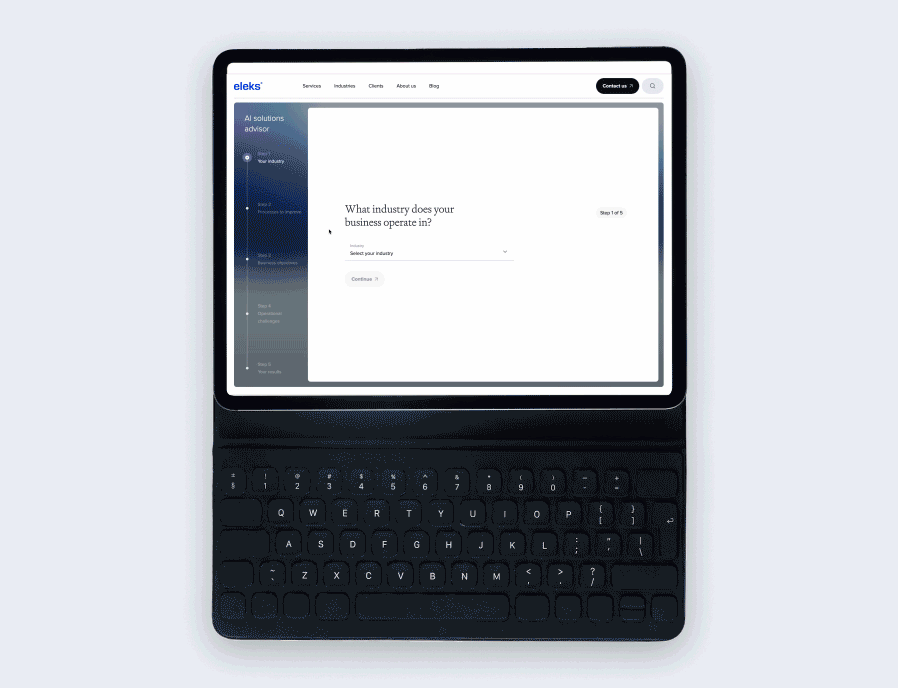AI technologies in retail are changing both digital and physical environments by analysing data, automating processes, and enabling personalised experiences throughout the value chain.
McKinsey research indicates that generative AI could create between $240-390 billion in economic value for retailers, while Salesforce data shows that 75% of retailers consider AI agents will become essential by 2026.
In a conversation with Sergii Bataiev, Director of Architecture and Technology at ELEKS, we explored how AI is driving the evolution from mass-market approaches to hyper-personalised commerce.
Sergii provides technical context on how AI is changing retailer-consumer relationships, retail infrastructure, supply chains, and data management as well as addresses common implementation challenges executives face when deploying AI solutions across their organisations.
How are AI technologies changing the traditional retail business model?
As these technologies mature, we're witnessing a fundamental shift from mass-market approaches to hyper-personalised shopping experiences that cater to individual preferences, interests, and needs with unprecedented precision. Amazon's new AI-powered 'Interests' feature exemplifies this evolution, using large language models to translate everyday language into sophisticated product recommendations that continuously update as new inventory becomes available.
What makes this development particularly significant is how it redefines the relationship between retailers and consumers. Rather than requiring shoppers to actively search for products, AI now serves as a personal shopping assistant that works proactively on the customer's behalf. The technology understands nuanced preferences—from "industrial-style decor that makes a statement" to "travel-friendly skincare products from premium brands"—and continuously scans vast inventories to surface relevant recommendations.
This represents a paradigm shift from reactive to proactive commerce, where retailers anticipate customer needs before they're explicitly expressed. As these AI systems learn from interaction patterns and feedback, they'll create increasingly personalised shopping journeys that feel less transactional and more relationship-based.

What other AI implementations do you see in the market?
Beyond Amazon's 'Interests' feature, there's some really cool AI technology popping up in the retail world that's opening up new possibilities. A great example is Estée Lauder's Voice-Enabled Makeup Assistant. This app isn't just about pushing more products; it's all about creating an inclusive experience. It uses advanced computer vision, facial recognition, and voice instructions to help users apply makeup, giving them real-time feedback along the way.
In the home goods sector, IKEA's Kreativ platform is a cool example of how AI can change the way we visualise and plan for new furniture. This tech combines spatial computing, machine learning, and 3D mixed reality to create a digital design space. Customers can check out products in 3D showrooms, but the standout feature is the Scene Scanner technology. It lets people create digital copies of their actual living rooms. They can virtually remove their existing furniture and try out new pieces in scale, which takes away the stress of not being able to picture how something will look in their space. Plus, it's interesting to note that they got this technology by acquiring Geomagical Labs. It shows how big retailers are bringing AI startups to fast-track their progress instead of trying to develop everything themselves.
Despite the potential of AI technologies, the widespread adoption continues to lag. Why?
Forbes points out that a whopping 85% of companies can have a tough time effectively integrating AI, and there are a few main reasons for this:
- A lot of companies struggle with poor data quality, which makes it hard for AI systems to give useful insights. This is a big reason why many implementations fail.
- Integrating AI can be really complicated, especially for businesses that have older systems running on different platforms.
- Many underestimate how much upkeep AI solutions actually need. Unlike traditional software, AI requires regular monitoring and tweaking.
Surprisingly, there's also often resistance from employees and customers themselves. Take Coca-Cola's AI-generated Christmas commercial in 2024, for example. It faced much consumer backlash, showing just how risky AI can be for a brand's reputation.
What broader implications does AI-driven personalisation have for retail business models, supply chains, and the overall consumer experience?
The implications extend far beyond convenience. As AI-driven personalisation becomes the norm, we'll likely see a restructuring of retail business models and supply chains to accommodate increasingly fragmented and specialised consumer demands. Retailers who master this technology will gain unprecedented insights into emerging trends and micro-segments, potentially allowing them to predict demand with greater accuracy and reduce waste.
For consumers, the shopping experience will become less about browsing countless options and more about curated discovery—finding products they didn't know they wanted but perfectly match their aesthetic, functional needs, and value proposition. The retail experience is evolving from a customer-initiated transaction to an ongoing dialogue between consumer preferences and AI-enhanced discovery systems that work continuously in the background to surface relevant opportunities.

FAQs
Retailers use AI to improve customer experiences, manage inventory, and streamline operations. They provide personalised recommendations based on how customers behave and what they buy. AI also helps forecast demand, which optimises stock levels and reduces waste. Additionally, computer vision technology allows for checkout-free stores and monitors shelves in real-time.
The future of retail AI will focus on personalised shopping and systems that make decisions on their own to meet customer needs quickly. Supply chains will adjust automatically based on real-time demand, weather, and social trends. AI will create engaging experiences that merge online and in-store shopping.
Fashion retailers use AI to improve customer shopping. One way they do this is by allowing customers to upload images of items they like to find similar products. They also offer virtual try-on technology, which lets shoppers see how clothes will look without trying them on in person. On the business side, predictive analytics help fashion brands spot new style trends from social media and runway shows. Many luxury brands now use AI to create unique limited-edition designs and improve manufacturing processes.
Related insights








The breadth of knowledge and understanding that ELEKS has within its walls allows us to leverage that expertise to make superior deliverables for our customers. When you work with ELEKS, you are working with the top 1% of the aptitude and engineering excellence of the whole country.

Right from the start, we really liked ELEKS’ commitment and engagement. They came to us with their best people to try to understand our context, our business idea, and developed the first prototype with us. They were very professional and very customer oriented. I think, without ELEKS it probably would not have been possible to have such a successful product in such a short period of time.

ELEKS has been involved in the development of a number of our consumer-facing websites and mobile applications that allow our customers to easily track their shipments, get the information they need as well as stay in touch with us. We’ve appreciated the level of ELEKS’ expertise, responsiveness and attention to details.
